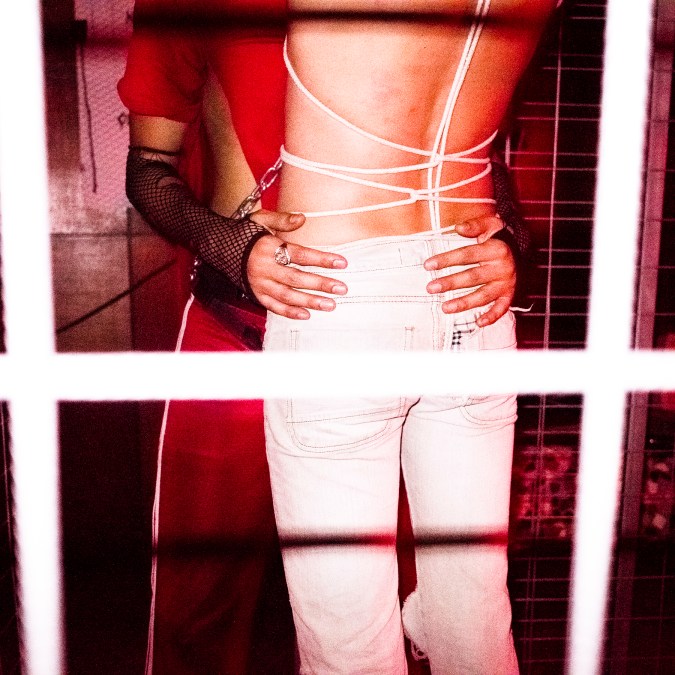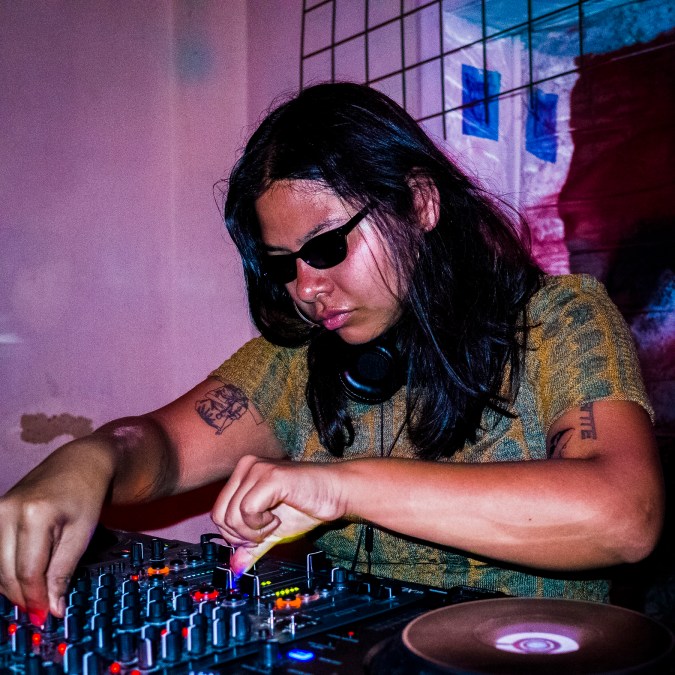Posters with non-negotiable policies like “Ni fachos ni machos,” “100pre todo con consentimiento,” and “Aborto legal seguro y gratuito ya” adorn a room along with chains and silk roses hanging from a red ceiling. Sweat drips from the walls, set to a soundtrack ranging from dembow, techno, and reggaetón.
The stewards of this experience – Quito-based collective SinVergüenza – established the recurring space in 2017 as a site of political discourse honed through collective action. SinVergüenza unapologetically centers pleasure as a radical act in an often oppressively conservative, Catholic Quito.
SinVergüenza emerged as a tangible project following dialogues between DJs and multidisciplinary artists J0ya and 5urdeaMarica, who at the time had both recently returned from studying abroad in Europe, where they had contact with other Latinx parties and collectives. They connected and began to unpack their outrage at Quito’s noticeable lack of spaces for their community. While Quito’s LGBTQIA nightlife offered what they felt was a hegemonic representation of gay nightlife, one that anchored in macho, alfa male corporate expressions, what they sought was a space that held closely the incantation: “una mariconeria más feminista, más interseccional.”

SinVergüenza then became an attempt to dive deep into the power of parties as a site of liberation and empowerment, combining DJ sets, live performances, and performance art.

By extension, this act is rooted in the belief that the personal is political, and that partying in effect holds the same place as an inherently, necessarily non-neutral space: “a space for expression and identity, pleasure and putería, affection and community, and as a possibility to strengthen the resistance.”
As such, the soundtrack is by extension both necessarily confrontational and “full perreo.” J0ya and 5urdeaMarica assert that “reggaetón is a way to desculonizarnos in many ways,” standing down classist marginalization of the genre and “nationalist boundaries through a common and popular non-elitist language understood across intersectional identities in Latin America.” This is a language both spoken verbally, and transmuted through the body – a meaningful expression for “perras [like us] simply because we really connect with the sexual lyrics,” as J0ya puts it.
Pleasure, a principle that connects the organizers and many other bodies identified with their community of mariconería and putería, is an act of resistance in itself, as confronting guilt and taboo in Ecuador was one of the primary motivators in starting SinVergüenza. While reggaetón speaks to sexual and body pleasure, albeit oftentimes in sexist expressions, J0ya and 5urdeaMarica say that creating a soundtrack from this baseline is an act of “reclaiming it, period – and enjoying.” In the sense of “perreo emancipador,” as la J0ya puts it, “for me, as a trans person, putting on a track that says ‘dime papi’ is an empowering act.”


To understand SinVergüenza’s message, is also to understand a highly-charged cross-section of social issues in Ecuador. Their first edition, in June of 2017, occurred in the house occupied by the Pachaqueer collective, which eventually became the more permanent home of the SinVergüenza parties. Every subsequent edition continued to fight for “perreo emancipador marica transfeminista,” courageously confronting and disrupting taboos in Ecuador. Another edition spoke to “pre-colonial cultures in Latin America, since pre-colonial sculptures reflect how indigenous cultures did not have a binary understanding of gender and sexuality in their cosmovision and art.”
Another version, named “DesCULOnizacion,” occurred during the Fiestas de Quito, which celebrated when the city was founded by the Spanish, who massacred and enslaved thousands of indigenous people. “We want to change the narrative of these holidays by dancing in resistance to the modern legacies of colonizations which we still haven’t overcome,” they say. Another edition took place during the 21st anniversary of the decrimininalization of homosexuality in Ecuador – a change propelled mainly by trans women of color, who they say “ have been invisibilized from history and are still discriminated even with the LGBTI community.”
More recently, SinVergüenza boldly shone a light on the violence and xenophobia that erupted in the country and throughout Latin America against the millions of immigrants and refugees from Venezuela. When they invited Venezuelan DJs and artists to be centered and celebrated in the space, far right nationalist groups campaigned and banned the event from Facebook. They were later able to recover the page thanks to the help of a feminist hacker collective. SinVergüenza again faced censorship following publication of their party challenging norms around Semana Santa, when pastors campaigned online to block the event.

Given these tangible challenges, as discourse around safe spaces and nightlife continues to circulate and evolve, SinVergüenza takes a realist stance on what they can offer. “Is it a safe space? No. The concept of safety usually comes from normative hegemonic institutions of power, like the police, that protects those who look cis-heterosexual, white, or unthreatening.
“SinVergüenza is a safer space for maricas and women because it is produced by some of them, and we try as a collective to maintain it that way,” 5urdeaMarica says. This intention takes the form of direct action – collective members work the door, being discerning about who they allow into the space, and they make sure to prioritize the trans community, who often travel from other parts of the country to attend. For them, the most important part of the party is that people otherwise not welcomed in other spaces can feel at home.
As the party has grown, SinVergüenza has straddled the line between inclusivity and education for folks not directly from their community but who still wish to attend. As a transfeminist celebration, as J0ya puts it “it is very important to speak about what happens to trans bodies; it’s very important to clarify this position for the people that go, as there’s people who show up that don’t know much about what’s going on – about our position, about the violence [our bodies] experience.”


While crowd control has been the intention, the buzz around the space has reached beyond the originally-intended community. “All of the other spaces are for heterosexual people. So when there’s a party [like SinVergüenza] that happens once in awhile, a night that we want for ourselves, that we built ourselves – we want to communicate things directly, to be clear that we do not accept certain [machista, homophobic, transphobic, racist] attitudes.” While they welcome folks to experiment and test their boundaries with their own gender expression, SinVergüenza is for the transfeminist community, as they believe that social change “comes from below from our own people.”
SinVergüenza strives for ways of decolonization also through self-determined language and narrative. While the majority of English-language writing around LGBTQIA nightlife hinges on a Eurocentric, privileged North America understanding of the concept of queerness, SinVergüenza instead chooses to focus on discourse that truly belongs to them – opting to not use the term “queer,” and instead to find empowerment through the term of “mariconería” that speaks to their specific reality. In taking back and transforming the word “marica” which was used previously an insult, as 5urdeaMarica puts it, “speaking of la marica is also speaking of the history of South America, of decolonization, of being able to describe the fights that the mariconería have lived here rather than drawing upon often whitewashed capitalist narratives of the North.”
The collective prepares to close this cycle with a final party welcoming their own personal apocalypse on June 8th: SinVergüenza XVI 666: Apocalipsis- Capitulo Final. However, they plan to keep collaborating creatively and politically through new iterations of art and activism– an essential act of ongoing resistance.

For J0ya, “now that everything is online, people follow SinVergüenza, and send us notes to say thank you for organizing the party. For us [it matters] to give them the space to feel good, to emancipate themselves, so that they don’t feel alone.”
5urdeaMarica spoke to the importance of the space, saying “it’s a place where people gather and meet, and for us it’s important to politicize these [informal] spaces as well. There’s no such thing as neutral parties, or neutral spaces – and we are in a position to say something that hopefully speaks to the mariconería of Quito.” He continued, “While it’s true that spaces condition and norm our behavior, collectively as maricas we have the power to condition spaces too. Sometimes being accepted is confused with being assimilated and sexually domesticated. La SinVergüenza is a space for people to create vínculos, or vín-Culos, to create an effective community. This is what matters over everything.”




